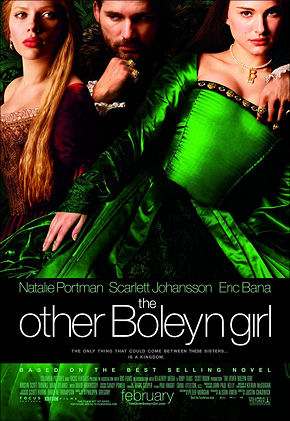wired
Real-life events behind “No Country”?
Kevin Bowen, who writes well, posted a fascinating piece last night about the certain names, places and events that may have inspired Cormac McCarthy‘s No Country for Old Men. In particular one Jamiel “Jimmy” Chagra, whose last name isn’t all that different from “Chigurh.”
Comfort blanket crowd
Every year the gulf between between those who judge films for what they actually are (or seem to be) and those who like or dislike films based on what the films do for them seems to get wider and wider. Industry lowbrows tend to favor comfort-blanket movies; others get their comfort blankets at Bed, Bath and Beyond and deal with movies on a slightly more engaged or inquisitive or cultured basis.
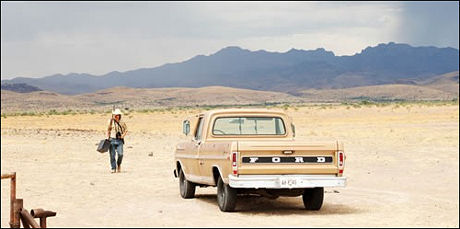
Case in point: Kris Tapley‘s item about No Country for Old Men screening at the Academy yesterday afternoon, and, according to one witness, how “‘people just got up shaking their heads’ following the film’s admittedly chilling ending.”
The guy also tells Tapley that “the screening was going well for the first hour or so, but the final act induced a certain level of shock that did not read as the positive sort. And, the attendee notes, there was very little applause over the film’s credits.”
You can’t goad people into being brighter or more educated or more respectful of the craft and intentions of the Coen brothers or original author Cormac McCarthy. You can try and shame them into responding a little less impulsively, but most of the comfort-blanketers are fairly dug into their way of seeing and processing. Some films reach right in and touch you; other times you have to probe and work your way into them. The general rule-of-thumb is that you need to at least try and meet a film halfway, but the comfort-blanket crowd…I don’t know. It’s very dispiriting. Infuriating, I really mean.
Due respect to a fellow columnist, but the ending of No County for Old Men isn’t “chilling” — it’s about sadness, lament, resignation. And no audience has ever clapped or or cheered as No Country cuts to black and final credits. It’s not that kind of film. It’s the kind of film that kicks in an hour or two later, or over dinner later on or while you’re driving or showering the next day.
Alzheimer’s Oscar Edge
Everyone’s noted the parallels between Sarah Polley‘s Away From Her, which is about an Alzheimer’s-afflicted older woman (Julie Christie) gently rebuffing her husband as she falls in love with another man (a syndrome common to sufferers of this disease), and the recently reported story about Supreme Court Justice Sandra Day O’Connor‘s Alzheimer’s- afflicted husband John falling for another woman.

Sandra Day O’Connor and her husband John March 2004
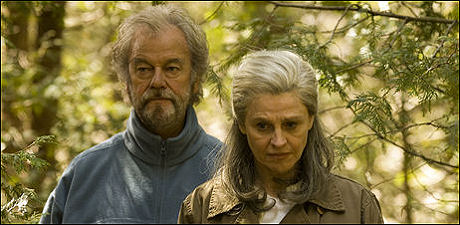
Gordon Pinsent, Julie Christie in Away From Her.
This will almost certainly push Academy members who haven’t seen Away From Her to pop the DVD in. It will also boost Christie’s chances of nabbing a Best Actress Oscar. (Not to sound insensitive or anything, but how can it not?) There was a feeling a few weeks ago that things were looking a little iffy because of Christie’s stated aversion to (cough) “campaigning.”
When will it end?
A voice is telling me that writers and producers will come to terms before Xmas, and if that doesn’t happen then by early to mid-January. I can’t see it going much further than that. Nobody wants an unscripted, sloppily improvised Oscar telecast, for one thing. And once films delayed or sidelined by the strike start to really pile up (Oliver Stone‘s Pinkville and Ron Howard‘s Angels & Demons are the first two victims), producers’ resolve will start to crack. How many deaths will it take ’til they know that too many revenue opportunities have died?
Sunday numbers
My source says Beowulf went up 5% from Friday to Saturday, and is now expected to take in $27,286,000 as of late tonight. Fantasy Moguls’ Steve Mason is reporting that Robert Zemeckis’ motion capture fantasy went up 20% from Friday and will tally just over $30 million. Deadline Hollywood Daily‘s Nikki Finke is reporting that Beowulf gained only 6% Saturday and will end up with $28.1 million. Add it all up and the verdict is that Bewoulf showed vigor and performed fairly well.
Gunn talks to Masterson
It may be difficult if not impossible to find a photograph of phantom New Jersey screenwriter Kelly Masterson, whose original script of Before The Devil Knows You’re Dead (written in ’99) finally made it to the screen this year. Directed by the great Sidney Lumet, it’s become one of ’07’s best reviewed films. Masterson’s reclusiveness is not on the level of Thomas Pynchon or Glenn Gould. He takes part in WGA picket lines and has given the occasional interview. This one with with AICN’s Elston Gunn — not given in person or over the phone, of course, but via e-mail — is worth reading.
Masterson comment #1: “I did not know I was writing a heist film; I thought I was writingacharacter piece. When I first sent it to my agent, I told him it was a dark drama about people who tragically can not extricate themselves from their own stupid behavior. It was not until later I realized that it was a heist movie with noir overtones.
Masterson comment #2 (responding to Gunn’s observation that BTHDKYD‘s nihilism is mixed with a wide range of emotion and melodrama, suggesting that ‘nihlodrama‘ could be the wave of the future): “I was not consciously writing a ‘nihlodrama.’ I wanted to burrow inside each of these four people and tap into their darkest impulses and then follow them as they tried to find the light despite their own darkness. I think of the story as more existential than nihilistic.”
Speilberg, Geffen talking to NBC Universal
“Seeking a way out of an acrimonious relationship at Paramount, the DreamWorks principals David Geffen and Steven Spielberg have been negotiating to move their operation to NBC Universal,” according to N.Y. Times reporters Sharon Waxman and Brooks Barnes. They add, however, that “negotiations have hit a wall over financing.”
One thing’s for sure — I will be on serious pins and needles until Geffen and Spielberg finally settle on a happy partnership. Knowing that they feel unfulfilled and unappreciated by their current partners at Paramount concerns me a great deal. Here’s hoping things work out with NBC Universal. I’m pulling for these titans of industry like a Dodgers fan pulling for his/her favorite pitcher or hitter during the playoffs. More power, more millions…hit it out of the park!
Note: Nikki Finke reported yesterday morning that the Times story is “all wrong.” She says that “everyone including me has reported that DreamWorks has been talking to NBC Uni since the summer…except for the N.Y. Times.” She underlines that DreamWorks is contractually prohibited from negotiating with other companies before April 2008, and that a “meeting” between Geffen and GE chairman Jeffrey Immelt, Universal boss Jeff Zucker and Universal Studios president Ron Meyer this coming week is “simply a dinner.”
And when these guys sit down they’re going to talk about what…starting a Bhagavad Gita reading group? Personal fulfillment issues? Sierra hiking trails?
D’Angelo on Blanchett
Esquire‘s Mike D’Angelo has written that Cate Blanchett‘s Bob Dylan performance in Todd Haynes‘ I’m Not There “goes beyond mimicry, capturing not only Dylan’s adenoidal mannerisms but his unruly prankster spirit. Whether needling pompous journalists or muttering random aphorisms, her ‘Jude’ greets the world with an expression of perpetual bemusement, as if enjoying some strange private joke.
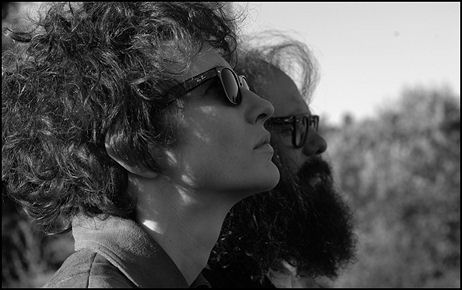
“It’s an uncanny approximation of the Dylan seen in Don’t Look Back — so convincing that you often forget you’re watching a gender-reversed stunt, and so mesmerizing that you can’t help but feel disappointed every time the movie cuts to one of the other, far less iconic pseudo-Bobs.”
Keri Russell
I dropped by the Four Seasons two days ago for a chat with Keri Russell. Not to talk about her latest film, August Rush (Warner Bros., 11.21), a Claude Lelouch-ian musical fantasy which I haven’t written about yet, but Waitress, which Fox Searchlight opened last May and which will re-open on DVD on 11.27. Directed by late Adrienne Shelly, it did well by reviewers and earned $20 million domestically.

Keri Russell — Thursday, 11.15.07, 3:45 pm.
Russell is friendly, casual, open. Like any successful actress, she knows how to charm without making it seem like an effort. Now 31, married and a mother of five month old child, Russell has been a working actress since she was 15. She has the agreeable aura of someone who’s lived through some ups and downs, and has been made wiser and stronger from this. She doesn’t seem the least bit neurotic or nuts. (Aren’t actresses are supposed to be a little bit twitchy?) Whatever — she’s an easy conversationalist.
I was okay with Waitress except for two significant things.
One, I couldn’t understand why Russell’s character, a spirited small-town waitress with a gift for cooking exquisite pies, is married to such an uncouth blue-collar pig (Jeremy Sisto). She’s bright and sensitive and appreciates the eternals, and yet she’s married to a brute caveman who does everything but club her on the head and drag her back to his cave by her hair. Such a relationship didn’t seem the least bit believable. In my experience animals hook up with animals and women with creative longings (stifled or otherwise) tend to hook up with guys who respect and understand them to at least some degree.
Ellen Burstyn was married to a guy like Sisto (played by Billy Greenbush) in Alice Doesn’t Live Here Anymore, but director Martin Scorsese solved the credibility problem with a two-line exchange. Burstyn’s on-screen son asks her why she married him and she says, “Well, he’s a good kisser.” That, at least, is some kind of explanation. Waitress provides nothing along these lines.
The other problem is that Russell’s affair with a small-town doctor (Nathan Fillion) goes on for months and months and no one gets wise including the doctor’s wife. Lovers make mistakes. Infidelity always comes out in the wash. People in one-horse towns always know who’s diddling who. It was nice not to have to deal with all that hurt and anger, but I still didn’t buy it.
Dreary “Hearts” DVD
George Hickenlooper and Fax Bahr‘s masterful Hearts of Darkness: A Filmmaker’s Apocalypse (Paramount Home Video, 11.20) is one of the best making-of-a-famous-movie docs ever made, but the new DVD looks like a VHS tape. It could have looked much better if the original elements had been remastered, but Apocalypse director Francis Coppola, who narrates the DVD along with wife Eleanor, provided PHV with “the same 1″ inch tape that was used when they struck the materials for the 1991 videotape,” says Hickenlooper.
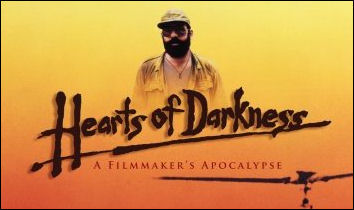
No remastering, tweaking or upgrading…brilliant! It’s almost 2008 with high-def video setting the hgh-end standard, and Coppola and Paramount Home Video have pooled their resources in order to give viewers an image consistent with video standards of 15 years ago.
DVD Beaver’s review says that “the quality is poor…parts of the documentary [are] dark and muddy since the footage was shot with 16mm cameras [and[ some scenes were shot or mastered on video. Plus “the raw footage that Coppola shot for his movie was un-restored (scratches, sprocket jumps, etc.), though scenes from the finished film look very good.”
DVD Talk’s review says “it’s aggravating that Paramount didn’t give the film a cursory touch-up…this 1.33:1 fullscreen transfer is only a step or two above my VHS copy of the film. The ragged, worn look does evoke the proper atmosphere, but the screens of text lack sharpness and often [and] the newer interview segments look flat and a bit washed-out…a very so-so transfer of a long-awaited title.”
“That Other Boleyn Girl”
The Other Boleyn Girl (Sony/Focus, 2.29.08), based on screenwrirter Peter Morgan‘s adaptation of the historical novel by Philippa Gregory, is about a sort of romantic competition between Anne Boleyn (Natalie Portman) and her older sister Mary (Scarlett Johansson) for the love and allegiance of King Henry VIII (Eric Bana).
We all know which sister lost her head in real life. (Those of us with a high-school education, I mean.) I’m not sure if the film delivers this particular climax, but it will apparently depict a romantic triangle and a hissing sisterly rivalry.
Wikipedia says that while Mary Boleyn was first to “know” Henry, she was actually King Henry’s “short-term lover” during the time that she was married to Sir William Carey (played by Benedict Cumberbatch).
Anne Boleyn, the account says, “resisted [Henry’s] attempts to seduce her and she refused to become his mistress. Eventually she accepted his marriage proposal and yet “she decided not to sleep with Henry before their marriage, as pre-marital intercourse would mean that any children they had would be born out of legitimate wedlock.”
As the trailer makes clear, the film’s problem is not historical accuracy but the ornate hats that Bana is obliged to wear. They seem historically authentic, but they make Bana look a little silly, like he’s playing dress-up in the attic with stuff he’s found in his great-grandmother’s chest. He resembles one of those middle-aged Italian fascists in that drag scene from Pier Paolo Pasolini‘s Salo: The 120 Days of Sodom.
